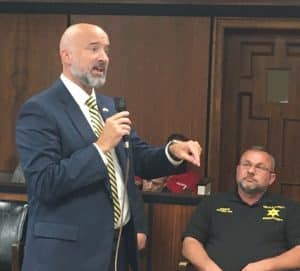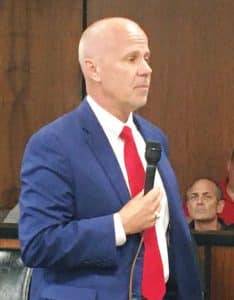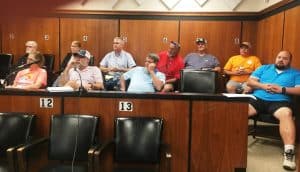June 18, 2024
By: Dwayne Page
One week before the county commission is scheduled to adopt the consolidated budget and set the property tax levy for the 2024-25 fiscal year, members of the jail committee, which makes up the county commission, met Monday night in the criminal courtroom of the courthouse to hear for the first time from judges who serve DeKalb County in the 13th Judicial District on infrastructure issues regarding the courthouse and jail.
Judges Gary McKenzie and Shawn Fry were invited to attend the meeting to express their concerns.
Their comments followed a power point presentation by County Mayor Matt Adcock showing cost comparisons of building a judicial center versus a new jail on either a new or the existing site along with projected costs of renovating the courthouse as well as other facts and figures related to the project. The Indepth report was compiled by County Commissioner Mathias Anderson.
Judge McKenzie, who has served on the bench for 10 years, began his career 24 years ago as a prosecutor for the District Attorney General’s Office. Although the issue is not new, Judge McKenzie said the courtrooms in the DeKalb County Courthouse are not large enough to accommodate the needs of the judicial system today which fosters greater security and safety concerns along with more frequent scheduling conflicts.
“Someone here made a statement tonight about future courtroom growth and need for it. You need that now,” said Judge McKenzie. “In this judicial district, you now have six circuit court level judges that operate in this court outside of General Sessions Judge Brandon Cox. You have six other judges that come here. There used to be five judges. We also have court dates where the Chancellor will go down to the basement courtroom of the courthouse (for court) because I am holding court up here (third floor) and the General Sessions Judge is holding court. That creates scheduling conflicts which we already have here. When I am setting a trial, I have to be mindful of how many days its (trial) is going to run and then I have to be mindful of who (which judge) has court here,” Judge McKenzie explained. “What that means for the citizens of your community is sometimes I can’t get my trial dates when I would like to because these courtrooms are booked up which means it takes longer for me to get a case tried. The result is it takes longer for the accused to have their day in court as well as the alleged victims to have their day in court. That prolongs how long those cases are pending which prolongs how long you have them (inmates) in your local jail before they are tried and possibly convicted of felony offenses. When that happens (trial and conviction), the state takes over and then they (inmates) go off to a state facility,” said Judge McKenzie.
“The other issue is this is by far the smallest courtroom in the 13th judicial district among all of my seven counties including Pickett and Clay County,” Judge McKenzie continued. “What that means is we cannot seat all of our potential jurors in this building (courthouse) anymore. There are just too many people. We had a trial recently regarding the aggravated rape of a child. To be able to try a case of that magnitude or a first-degree murder case, we need at least 80 potential jurors to do the jury selection process in order to get to the final 12 jurors. We couldn’t fit them all in here (courtroom). Its just too cramped. What we have done to help the situation is go to the county complex to seat jurors (before the eventual trial at the courthouse),” said Judge McKenzie.
As for safety concerns, Judge McKenzie cited an incident which occurred in court only a few weeks ago.
“You have a safety issue here in this courtroom. You have inmates that come in here and some of them are not the nicest people that you would want to have seated this close to you. Recently we had the outburst of an inmate and the court officers had to physically restrain the individual in this room, take him out the door and in doing so the door swung open and hit an individual citizen that was standing on the other side of the door. That person was hurt and had to go to the emergency room. That is a security risk,” he said.
Judge McKenzie went on to speak of the advantages in having a justice center and the disadvantages of having one downtown.
“The thing that a justice center helps for you is that if you have a secure location. For example, in a justice center setting this door (courtroom exit door) would go straight to the sheriff’s department (in the same building) and there would be actual jail cells outside of that door. When inmates are seated in the courtroom and then taken out, they would go straight to a jail cell only a few feet away. Unlike the flights of stairs prisoners now have to be taken down and across the street here to get back to the jail from the courthouse,” said Judge McKenzie.
“If you have a justice center it has to be in the county seat. That’s state law. In Putnam County we recently built up on the jail. Back in the 1980s they made a decision there to do a justice center and they put it in the middle of town. They built it downtown Cookeville by the old courthouse. We recently had to go up with the building but now we are struggling with parking and have no room for growth there. Right now, the local businesses in Cookeville are screaming because when we have court everybody parks there. I would say to keep in mind that a physical location (downtown) if you commit here, you may have growing pain problems like we have seen in Putnam County where we are,” said Judge McKenzie.
Judge Fry, who was appointed by the Governor last year to fill a newly created criminal court judgeship in this district, urged the county commission to seriously consider building a new facility somewhere other than downtown. He also spoke of the unreliability of the existing courthouse’s heating and cooling system.
“Back in the winter we had a case set for trial here, but it was literally too cold in this room to have that trial,” said Judge Fry.
“One of the issues I hear you talking about is should you build a jail right here on the public square,” Frye said. “Times are different today. Its not so much of a jail anymore as it is a mini prison. That’s the way county jails are now. The state of Tennessee is contracting more and more with local certified jails to hold low level felons that are not violent, and the state of Tennessee pays for that and it’s a source of income for counties and that’s how some counties pay for their jails. Just ask yourself this question. Are you seriously going to consider building a prison right here in downtown? Could you even consider building a larger jail with more inmates and no courtroom space to bring anybody to trial? Justice delayed is justice denied and if you can’t have a trial in a case, how do you seek justice in those situations?”
“When we talk about courtroom renovations here, I think to myself how? We can’t house anybody here (courthouse),” said Judge Fry. “We will have inmates (Tuesday during court) sitting in the jury box. We will also keep a handful of seats on the other side of the courtroom for the women prisoners. In this courtroom the audience is only about eight feet away from being able to hand something to a serious felon”.
“This process (jail construction) has been delayed and delayed here until now its become a huge problem for you and it’s a huge expense,” Judge Fry continued. “The question is what other alternative do you have? You have to do something about your jail, but you can’t fix the jail and not provide the courtroom space. You can’t do one without the other. They have to be together but to consider building a prison here in the downtown area, I just hope and implore upon you to consider some other option than doing that,” said Judge Fry.
General Sessions and Juvenile Court Judge Brandon Cox said security issues at the courthouse need to be addressed immediately for better protection of the courts and public as well as the clerks and others who occupy the courthouse on a daily basis. He has addressed this issue before with the county commission.
“We have an infrastructure, space, and safety issue with this building,” said Judge Cox. “I believe we have the only courthouse in this entire judicial district where you can walk in (enter the courthouse) without getting checked or scanned. I don’t think you have to be very determined to get in here with a weapon. There is nobody stopping you at any of the three (courthouse) entrances. When you enter the building, you can go and knock on the county mayor’s door or see the clerks”.
“Right now, if there is a judge on the bench, there is going to be two court officers in that courtroom or more (2 per courtroom) if we have multiple judges holding court at the same time in this building. Tomorrow (Tuesday) we are going to have child support downstairs (first floor), criminal court up here (third floor), and my court in the General Sessions courtroom (third floor). I don’t know how many officers he (sheriff) has but he is going to be stretched thin. Come to (General Sessions) court and you’ll find yourself sitting right beside the inmates. In this (GS) courtroom they (inmates) have to walk right past the public to get to the podium to talk to me. Whatever you do as far as a justice center for the future, security needs to be addressed now. We have been blessed and lucky that nothing major has happened,” said Judge Cox.
Lack of available courtroom space is also a reason, according to Judge Cox that some of the district judges occasionally choose to schedule DeKalb County court dates in other counties.
“We have Judge Caroline Knight, Judge Will Ridley, and Chancellor Ronald Thurman that hold court in civil cases and they are here at various times but the reason they are not here more often is because they don’t have the space. Their time is better spent in Putnam or Cumberland County where we (lawyers locally) have to travel to because they have more room there. They have places they can hold court, so we are like Lincoln lawyers here taking our clients to Putnam or Cumberland County to solve cases. That is not helpful to attorneys here but more so for the public,” said Judge Cox.
County Mayor Matt Adcock said after months of meetings and planning, the time has come for the county commission to take action on addressing the jail/judicial center issue.
“We are facing a lot of challenges, and we don’t have a whole lot of time. We have had jail committee meetings since February 2023. Its been over a year now. We have discussed and looked at all the options of building onto the existing jail, to building a jail or judicial center where its at or in a different location. Now we are here in June trying to pass a new budget and we have to pass a tax levy that is going to fund whatever it is we are going to do. The only time you can set your tax levy is when you appropriate your budget. You can’t come back in the middle of the year and change it. Once you set the tax levy and its voted on its set until June 30, 2025. These are hard decisions, but I think we have had enough information presented to make a good decision. When you look at it altogether and the costs of all the options, the justice center at a new location is still going to be the cheapest even though we would have to make some small renovations here (courthouse) with the normal maintenance of the building such as heating and cooling and an increase in minimum security,” said County Mayor Adcock.
During next Monday night’s regular monthly meeting, the county commission will consider establishing an overall property tax levy of $2.61 cents per $100 of assessed value when the proposed consolidated budget is up for adoption. That’s a 61-cent hike from the current tax levy of $2.00 per $100 of assessed value. A year ago, the rate was $1.7308 cents. The commission will also consider adopting an initial and detailed bond resolution not to exceed $65 million for the construction of a judicial center/jail.
Fifty-one cents of the proposed tax increase would go to fund debt service for a judicial center/jail while the remaining 10 cent increase would be allocated to schools to help fund the proposed new school budget which includes pay raises for certified personnel and support staff.
The county commission will likely act on a resolution to have a public referendum on the ballot in the November election asking DeKalb County voters if they would support a $100 wheel tax for debt service to fund construction of a judicial center/jail. If approved by the voters, County Mayor Adcock said funds from the wheel tax could help offset what a proposed property tax increase would generate in the meantime for debt service and allow the county to eventually scale back the size of the overall tax hike for the 2025-26 fiscal year after the wheel tax proceeds start coming in.
The county commission meeting Monday night, June 24 will be at 6:30 p.m. in the auditorium of the Mike Foster Multi-Purpose Center.







